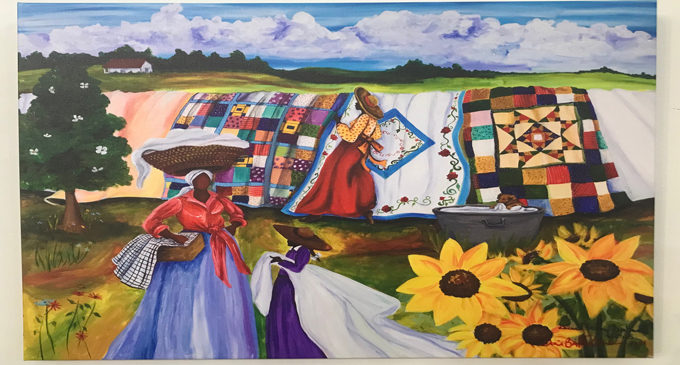Delta Art Center’s new exhibit tells stories of the Gullah culture
“Country Quilts” by Diane Britton Dunham.

By Judie Holcomb-Pack
Someone once said, “A picture is worth a thousand words.” That could well sum up the new exhibit at Delta Arts Center, “Culture Keeper: The Gullah Art of Diane Britton Dunham,” that opened on June 3 and runs through the summer. Each painting depicts a moment in time and tells a visual story of a culture that for generations was cut off from mainland South Carolina, allowing the culture to maintain its unique customs and dialect.
An artist talk with Diane Britton Dunham on June 4, held both in person at the gallery and virtually via Zoom, brought to life the stories behind each piece of art. Her works examine the common traditions of African American culture, especially those of the South Carolina Low Country and Sea Islands.
Internationally recognized for her authentic illustrations of the history and traditions of African American Southern culture, Diane Britton Dunham’s art is visually unique due to their vibrant colors and her ability to capture community life in South Carolina’s Low Country and Louisiana’s bayous, thereby telling stories through her art. A self-taught artist, Dunham has established herself as not only an artist, but a historian, writer, and instructor. She currently serves as vice chair of the Beaufort Arts Council Board of Directors, the chair of the Gullah African Diaspora Artists group, and serves on the University of South Carolina Art and Design Advisory Board.
Dunham’s interest in portraying the Gullah and Low Country culture stems from her parents; her mother is Creole and her father is from Charleston, S.C. She writes: “From a small child, my ancestral history has held a fascination for me, and each day I find something new and exciting to produce through my art. It has been a blessing to have had the opportunity to share my vision with so many.”
Dunham was commissioned by the historic Penn Center, the first Southern school for freed slaves, to bring the Sea Island culture to life through her paintings. The islands were isolated from the mainland of South Carolina and after the Civil War, the isolation increased, allowing the unique culture to remain undisturbed and available only by boat. The bridge connecting the islands to the mainland wasn’t built until the 1940s.
The Gullah culture is well known for its sweetgrass baskets which are identical to those made in West Africa. The talent to create these unique baskets has been passed down through the generations and today are valued as art rather than for their utility. The baskets are so carefully woven that water cannot seep through their weaving.
Dunham’s work focuses on several important aspects of the culture: their religion, basket weaving, food, music, agriculture, fishing and shrimping, and education, which can be seen in her paintings. “Praise House,” a small, plain house of worship common on Sea Islands, illustrates where enslaved people worshipped in small gatherings, which kept them safe from the eyes of their oppressors.
“Songs in Zion” is a beautiful representation of the love of music and the joy it brings to the Gullah people. Many of her works include quilts, such as “Country Quilts.” Women used swatches of beloved family members’ clothing that were sewn into quilts to create a family story quilt. Quilts were also an important part of maintaining the Underground Railroad and some of her pieces illustrate quilts that warn travelers to “zig and zag” to confuse the oppressors who were searching for them, or have a star in the center that when hung up, points in the safest direction to the Underground Railroad.
In her artist’s talk, Dunham explained why many of her pieces do not detail the faces of the people. She said that if she has captured the emotion in the painting, this allows the viewer to put their own faces in the work, to interpret the story in a more personal way.
If you look closely enough, focus on the details and allow the emotion to touch you, each painting on exhibit will truly tell you a story. In this sense, the old adage is true: a picture is worth a thousand words. Stop by Delta Arts Center, 2611 New Walkertown Road, and let them speak to you.
Delta Arts Center is open Tuesdays and Fridays from 2-5 p.m., Wednesdays and Thursdays from 3-6 p.m., and at other times by appointment by calling 336-722-2625. For more information, visit www.deltaartscenter.org or follow them on Facebook.











